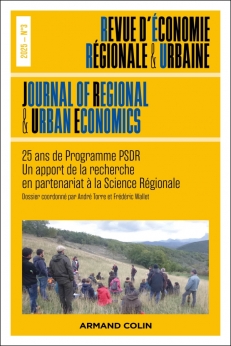
REVUE D'ÉCONOMIE RÉGIONALE ET URBAINE (3/2025)
Pour acheter ce numéro, contactez-nous
Recevez les numéros de l'année en cours et accédez à l'intégralité des articles en ligne.
La notion de SyAM a trouvé son origine en étudiant le développement de différents collectifs hybrides constitués d’agriculteurs, de transformateurs et de distributeurs qui présentent la spécificité de mettre en œuvre des partenariats dits « gagnant-gagnant », passant par une reterritorialisation de leurs chaines d’approvisionnement. Si les SyAM sont aujourd’hui mieux connus, peu de travaux se sont encore interrogés sur le rôle d’une collectivité dans le soutien à la mise en place de ces partenariats. Dans cet article, nous nous intéressons plus particulièrement au cas du Département de l’Isère qui a développé depuis le début des années 2000 une politique visant à favoriser une relocalisation à grande échelle de son alimentation. Nous posons la question de son rôle dans le développement de ces collectifs et nous montrons en quoi ce rôle « fait SyAM ». Faire SyAM, c’est participer à un processus qui vise la poursuite de performances durables, facilitant une plus juste rémunération des agriculteurs.
The concept of mid-tier food supply chains originates with the study of the development of various hybrid collectives which include farmers, processors, and distributors. Mid-tier food supply chains have the specificity of implementing so-called win-win partnerships among actors making up these collectives, through a re-territorialization of their value chains. Although the mid-tier food supply chains concept has gained prominence in this context, few studies have thus far examined the role of local authority in supporting the establishment of these collectives. This article studies Isère’s Departmental Council (France), which has developed since the beginning of the 2000s a policy to promote the large-scale relocation of its food supply. The question raised in this paper concerns the Departmental Council’s role in the development of these collectives and we show how it “makes” mid-tier food supply chains. To support the growth of mid-tier food supply chains is to participate in a process that aims for the sustainable performance of these collectives by supporting fairer remuneration for farmers. The article focuses on two main methods of intervention used by the community to make mid-tier food supply chains. First, by relocating its supply basin, and second, by supporting the development of new regulations to match the scale of the supply chains it supports. We show that the Isère Departmental Council is strongly committed to the development of this innovative system, and thus, in supporting them with its policy. We highlight those actions carried out through these two modes of interventions and reflect on their contribution to the success of mid-tier food supply chains. Finally, we examine the levers that the Departmental Council can activate to make such a policy a success and highlight the interest of activating a multi-stakeholder and multi-scale governance.